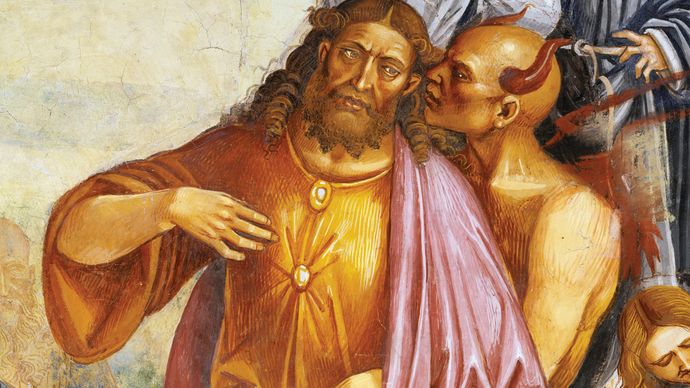In the office of Readings for today we are assigned I John 4:1-10 in which the Apostle speaks about the AntiChrist. Due to end times dispensationalist preachers many people think the AntiChrist is a particular individual who appears at the end of time to usher in the Rule of Satan. St John actually teaches something else:
It is not every spirit, my dear people, that you can trust;test them, to see if they come from God,there are many false prophets, now, in the world.You can tell the spirits that come from God by this:every spirit which acknowledges that Jesus the Christ has come in the fleshis from God;but any spirit which will not say this of Jesusis not from God,but is the spirit of Antichrist,whose coming you were warned about.Well, now he is here, in the world.
St John says the key is that they deny the reality of the incarnation. In the early days of the church this would have meant that they literally, in some way, denied the fullness of the doctrine of the incarnation and thus we had all the Christological controversies in the first three centuries of the church.
Now this denial of the incarnation takes a different form. So modernist Biblical scholars do not formally deny the incarnation, but they deny the historical accuracy of the gospels. They weed out the supernatural element, reducing the gospel to no more than meaningful parables or a collection of moral teachings. They do not deny the incarnation formally, but they deny the reality of the Virgin Birth, “re-interpret” the resurrection to mean “in some way the beautiful teachings of Jesus continued even after his tragic death”. They say the feeding of the 5,000 was all about “sharing our lunch” and walking on the water is “a beautiful story about faith.”
How else is the AntiChrist active among us? By denying that Christ has come in the Flesh” through the mystery of the Church. They reduce the church to a charity or an NGO–a human organization to make the world a better place. The true power of the church to save souls, heal the sick, defy Satan and preach the truth is sidelined in favor of worldly agendas to save the environment, solve economic problems, feed the hungry and house the homeless. While these may be noble and good efforts they are not the primary mission of Christ and his church, and to make them the primary mission is to deny that Christ has come in the flesh.
A third way the AntiChrists deny the incarnation is to blaspheme against the reality of his presence in the sacraments. Christ has “come in the flesh” through the sacraments. Whenever the sacraments are degraded, abused, mocked or denigrated in any way you are seeing the work of AntiChrist. So, when people celebrate the sacraments knowing they are in a state of mortal sin they do the work of AntiChrist. When priests knowingly and publicly administer the sacraments unworthily and to people they know are in a persistent, public state of mortal sin they deny the power of the sacrament, and thus deny that Christ has come in the flesh. When we celebrate Mass irreverently or use the sacraments for our own agenda we do the work of antiChrist.
Another way the spirit of AntiChrist is present is by practicing or preaching a religion of Christ without the cross. A Christianity that promises to sweep away all our troubles as if by magic is a religion of the AntiChrist because the fullness of Christ’s incarnation is seen in the crucified one. He was not only born in a stable. He was hung on a cross. Christianity without a cross is a religion for liars, simpletons and cowards.
Finally, the spirit of AntiChrist is present most powerfully in our age through the presentation of the false Christ of sentimentalism and faux victimhood. People who parade their virtue in a form of tenderness towards most anybody or any group who whimper and whine just a little are portraying not the true and fully human Christ, but only one side of him–the compassionate Lord of Forgiveness.
This is exhibited by the person overlooking sin rather than forgiving it. It is “neither do I condemn you” without the “Go and sin no more.”
Living within the power and the glory of the fully incarnate Christ is not easy. We can all fall into AntiChrist attitudes and behaviors.May the Lord have mercy.







Leave A Comment
You must be logged in to post a comment.